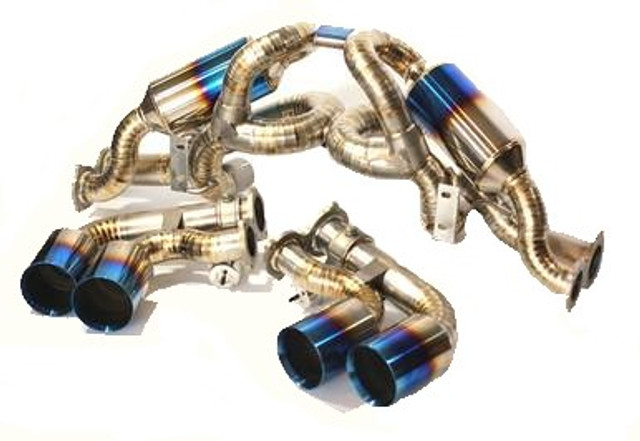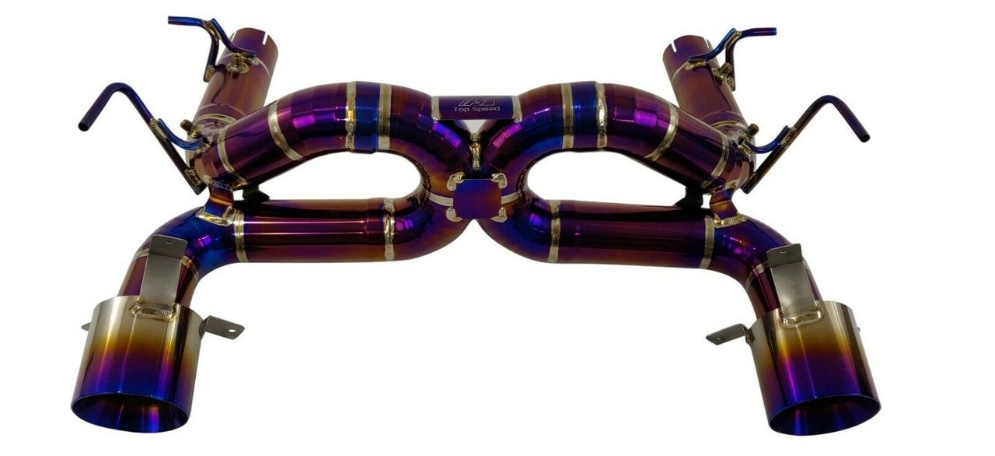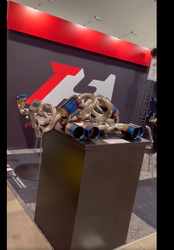TITANIUM VS STAINLESS STEEL EXHAUST
Posted by Sean@topspeed on 1st Dec 2022
TITANIUM VS STAINLESS STEEL EXHAUST?
So, you want to upgrade your vehicle’s performance, but don’t know where to start? One of the most popular places to start any performance upgrade is exhaust. The exhaust system is not within the engine, so it is typically easy to access and somewhat easy to install for the novice performance enthusiast or beginner. It also provides a tangible and noticeable performance gain, as well as giving you that aggressive growly tone that your car lacks from the factory! However, if you do some research online you will find numerous brands of exhaust to choose from, a wide range of pricing, and even a wide range of exhaust materials available. Among the most common choices are stainless steel and titanium. Stainless-steel is the most commonly used, and less expensive. However, titanium is a stronger material and can be heat-treated to create a range of vivid colors on the material which some folks just can’t live without! This begs the question: which material is better for my exhaust? Let’s explore this in more detail…
STAINLESS STEEL

Stainless steel has long been the most common material used for exhaust components and for good reasons. It is a very durable material that can be mandrel bended to allow for minimal welding and less overall separate components. The key to any exhaust system is to maximize airflow and have the least number of obstacles between the engine and exhaust exits. Stainless steel is also very affordable to manufacture and to replace if in fact you ever need to replace a portion of the exhaust from damage or deterioration.
However, stainless steel is not truly “stainless” as the name suggests. Stainless steel is prone to rust and corrosion from the elements, especially if you live near the ocean or in northern climates where there is a significant amount of salt used to de-ice the roads in winter months. Salt is stainless steel’s kryptonite. In fact, I am pretty sure Superman is on a low-sodium diet! Stainless steel can also deteriorate over time just from exposure to being outside so if your car is not garage-kept, it is a good idea to check the undercarriage of your vehicle every so often to inspect the exhaust system for any rust or corrosion. We posted a video on this below on how to care for your stainless-steel exhaust system.
T304 Steel also known as 304 Steel is one grade from the family of 300 Steel grades (301, 302, 303, 304, 307, 316, etc.). The T304 steel is one of the softest grades. The difference which makes it more recognizable as soft steel is that this grade is soft yet very durable, flexible, and easy to trim, mold or bend. T-304 is the most used stainless steel in the world. It is used in a variety of products including forks, knives, steel wires, medical and personal care instruments, automobiles, machine parts, etc. It is weldable, machinable as well as having good corrosion resistance characteristics. Although it is corrosion resistant, it is not recommended for saltwater environments.
Grade T304 steel has a competitor known as T409. This steel grade is a low-price grade compared to T304, therefore, in some cases it is preferred over T304, but when it comes to long-term reliability, better finish and durability, T304 is the better choice. T409 can get surface corrosion easily, though the corrosion appears on the surface it will damage the structure from inside. If you are purchasing a stainless-steel exhaust, it is a good idea to confirm that the material is T304
TITANIUM


Titanium is becoming a very popular choice of materials for exhaust systems for a few reasons. Titanium is roughly 40% lighter than stainless steel and if you are looking for weight reduction on your vehicle to increase performance, titanium exhaust can help you achieve this. In some cases, you can save 100 lbs. or more just by swapping out your factory exhaust for a titanium aftermarket system. For example, our Top Speed Pro 1 Performance Corvette C8 Straight Pipe Titanium Exhaust System weighs in at only 10.8 lbs. vs. the Corvette factory exhaust which weighs in at over 120 lbs.! That is over 100 lbs. in weight reduction! This could equate to a tenth of a second increased overall speed in the quarter mile. In drag racing, this tenth of a second could mean the difference between winning or losing!
So, it is true that titanium is a stronger material than stainless steel. However, is it more durable? Well, that depends on the application. When it comes to exhaust systems, the titanium tubing used is a thinner gage material than stainless to allow for an easier time in the manufacturing process. Titanium also cannot be mandrel-bended like stainless-steel which means they use a process called “pie cuts” which cuts sections of titanium tubing at multiple angles and welds these together to achieve the necessary bends in the system. As strong as welds are, they are never going to be as strong as one piece of material that has been mandrel bent. So, if you drive your car at high speeds or take your car to the track on a regular basis, titanium will not hold up over the long-term. If this is your driving style, we recommend stainless steel over titanium.
Titanium welding is also more involved and expensive than stainless steel. To achieve a strong weld, you must back-purge the gas to maintain a strong durable weld. You also must use shielding gas around the weld to avoid the weld absorbing oxides which will contaminate the weld. This is a more time-consuming process and is a significant factor in why titanium exhausts are more expensive overall vs stainless steel. Titanium tubing is also more than triple the cost of stainless steel.
One other advantage to titanium is what can be done when you heat treat the material. If you heat titanium at around 800 degrees Fahrenheit, you can achieve a beautiful purple color that many car enthusiasts rave about! At 1000 degrees the purple turns to a deeper blue that some would argue is even more appealing! This cannot be done with stainless steel. Also, your raw titanium material will change color just from the natural heat from the exhaust.
So how do I know if I am getting the good stuff? There are 4 primary grades of titanium. Grades 1-4, grade 4 having the highest interstitial elements. In general terms, grade 4 or higher is what you are looking for in terms of the material being a quality durable alloy for use in automotive applications. Top Speed Pro 1 Performance uses only Grade 4 or 5 Titanium in all our titanium exhausts.
CONCLUSION
Stainless steel is the more durable material to use for high RPM, high heat track conditions hands-down. The sound of stainless steel exhaust tends to be a bit deeper and throatier than titanium. Sound quality is a matter of opinion so we will leave it up to you on what you like to hear from your tailpipes! It may not look as pretty or be as lightweight as titanium, but it will not let you down as you take the checkered flag! Here is a video of the Stainless Steel X-pipe exhaust for the Corvette C8:
Titanium is better for the overall look of the exhaust as well as giving you significant weight savings! This is the popular choice with many rear or mid-engine vehicles as the exhaust system is often visible from the top of the vehicle and makes for a better show car appearance! Titanium tends to have a tinnier sound than stainless steel, but still will give you a deeper more aggressive tone than your factory exhaust! You can still have fun on the weekends with titanium and it will hold up well in most conditions. Here is a video of the Titanium X-pipe exhaust for the Corvette C8:
Here is a another great video from one of our customers who has used both of our Top Speed Pro 1 Performance Titanium and Stainless Steel exhausts for his C8 Corvette and he shares his thoughts on why one may be better than the other depending on your driving habits.
We hope this information was valuable to you and we will continue to add more content like this to our blog in the coming weeks and months!


